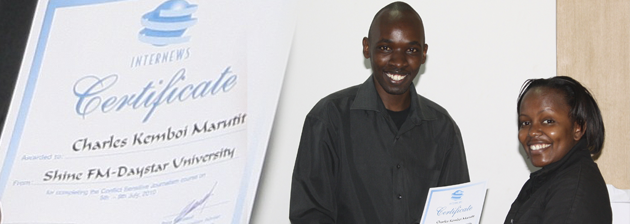
In 2010, Internews Kenya ventured into training of journalism students. A partnership with Communications students from Daystar University on conflict-sensitive reporting resulted in a number of stories being produced on conflict-related issues. Recently one of the students, Charles Kemboi, received an award from Farm Radio International, an organization based in Canada. Internews trainer Mary Kiio interviewed Charles as he celebrated his award. Mary Kiio: Charles, you have recently graduated from Daystar University and won a Farm Radio International Award for working on an online radio script. What a year for you! Can you tell us more about the scriptwriting course? Charles Kemboi: Farm Radio International is a Canadian based Non Governmental Organization. It organizes a script writing competition open to broadcasters every year. Prior to submission of scripts by competitors, the organization conducts a 10 week scriptwriting course. M: What was the award you won? C.: I won the Farmer Voice Award. This year they selected 10 winners out of the 128 entries received from 23 countries in Africa. The winning scripts will soon be published in French and English and distributed by Farm Radio International to various radio organizations across sub-Saharan Africa. M. K.: Can you tell us about the story you worked on to win this award? C. K: The youth of Kibera have over many years been faced with several challenges ranging from unemployment, drug abuse, lack of education and vocational skills among other myriad of issues. I did a story of hope that focused on a group known as Pamoja Youth Foundation. It started after the 2007 post-poll violence and is transforming the lives of people across the 13 villages situated in the slum. M. K.: Did you focus on the whole group’s story? C. K: No. I focused on an individual, John. John was trapped in abuse of drugs and got involved with drug cartels in the slum. As a result, he dropped out of high school, became a burden to his parents and finally ran from home. The future then seemed bleak for him. But one day he attended one of Pamoja Youth Foundation weekend outreaches and he decided to join the group as a member. He underwent rehabilitation and today, John is the Head of Democracy and Governance in the organization. He has been a positive influence in helping his friends join the group and change is now taking place in Kibera. M. K.: You recently graduated from an Internews training on Conflict Sensitive Journalism. Did this in any way impact your online scriptwriting course and your awarded story? C. K: Yes it did. Especially, when it came to writing for the ear and techniques of handling a digital recorder. Internews also helped me by supplying a zoom recorder for field use and in providing a computer for editing to ensure sound was of good quality. The mentoring sessions I had with the trainers also helped keep me on toes. M. K.: What are your plans in the future with regards to your journalism career? C. K: I hope to use the skills that I have gained from this course and previous trainings for the betterment of my journalism work. I also do hope to get involved in sharing these skills especially on radio with young people who are still in primary and high school, as these are the journalists of tomorrow. I hope that with enough resources, perhaps, I will own a private or community media house someday. |
-
Health Summaries
Maternal health goal still a farfetched dream New treatment methods lower TB infection rates Kenya: NCDs and HIV fight for limited resources Tuberculosis and HIV rife in Kenya prisons HIV screening, ignorance keeping blood donors away New strategy now planned to increase HIV testing Maternal, child health highway littered with broken promises Concern over HIV in schools rises View all -
Democracy and governance Summaries
NGO Wants Seat in Land Committee Did Hague Hearings Shake us out of our Rigidities? Mutula Tells CIC to Stop Opposing Change of Election Date Mutula Faults ICC over Failure to Record Big Three TJRC Promoses Justice for Kiambaa Fire Victims Ghaii Says Polls should Held in Early 2013 Listing of Wealth will Curb Graft, Panel Told Telkom Kenya Sued in Sh1.5bn Land Sale Row View all Twitter
 Mtandao Wa InternewsA platform for Kenyan journalists to share stories
Mtandao Wa InternewsA platform for Kenyan journalists to share stories
 Work with us Opportunities to join the great team!
Work with us Opportunities to join the great team!
 Internews E-Learning. Online platform for trainer trainee interaction
Internews E-Learning. Online platform for trainer trainee interaction OpportunitiesCurrent and upcoming opportunities for journalists
OpportunitiesCurrent and upcoming opportunities for journalists



